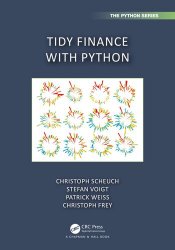Tidy Finance with Python
- Добавил: literator
- Дата: 25-06-2024, 01:12
- Комментариев: 0
 Название: Tidy Finance with Python
Название: Tidy Finance with PythonАвтор: Christoph Scheuch, Stefan Voigt, Patrick Weiss, Christoph Frey
Издательство: CRC Press
Серия: The Python Series
Год: 2024
Страниц: 262
Язык: английский
Формат: pdf (true)
Размер: 10.1 MB
This textbook shows how to bring theoretical concepts from finance and econometrics to the data. Focusing on coding and data analysis with Python, we show how to conduct research in empirical finance from scratch. We start by introducing the concepts of tidy data and coding principles using pandas, numpy, and plotnine. Code is provided to prepare common open-source and proprietary financial data sources (CRSP, Compustat, Mergent FISD, TRACE) and organize them in a database. We reuse these data in all the subsequent chapters, which we keep as self-contained as possible. The empirical applications range from key concepts of empirical asset pricing (beta estimation, portfolio sorts, performance analysis, Fama-French factors) to modeling and machine learning applications (fixed effects estimation, clustering standard errors, difference-in-difference estimators, ridge regression, Lasso, Elastic net, random forests, neural networks) and portfolio optimization techniques.
Why Does This Book Exist?
Over our academic careers, we are continuously surprised by the lack of publicly available code for seminal papers or even textbooks in finance. This opaqueness and secrecy is particularly costly for young, aspiring financial economists. To tackle this issue, we started working on Tidy Finance to lift the curtain on reproducible finance. These efforts resulted in the book Tidy Finance with R, which provides a fully transparent code base in R for many common financial applications. Since the book’s publication, we received great feedback from students and teachers alike. However, one of the most common comments was that many interested coders are constrained and have to use Python in their institutions. We really love R for data analysis tasks, but we acknowledge the flexibility and popularity of Python. Hence, we decided to increase our team of authors with a Python expert and extend Tidy Finance to another programming language following the same tidy principles.
Key Features:
Self-contained chapters on the most important applications and methodologies in finance, which can easily be used for the reader’s research or as a reference for courses on empirical finance.
Each chapter is reproducible in the sense that the reader can replicate every single figure, table, or number by simply copying and pasting the code we provide.
A full-fledged introduction to Machine Learning with Scikit-learn based on tidy principles to show how factor selection and option pricing can benefit from Machine Learning methods.
We show how to retrieve and prepare the most important datasets financial economics: CRSP and Compustat, including detailed explanations of the most relevant data characteristics.
Each chapter provides exercises based on established lectures and classes which are designed to help students to dig deeper. The exercises can be used for self-studying or as a source of inspiration for teaching exercises.
Who Should Read This Book?
We write this book for three audiences:
• Students who want to acquire the basic tools required to conduct financial research ranging from the undergraduate to graduate level. The book’s structure is simple enough such that the material is sufficient for self-study purposes.
• Instructors who look for materials to teach courses in empirical finance or financial economics. We choose a wide range of topics, from data handling and factor replication to portfolio allocation and option pricing, to offer something for every course and study focus. We provide plenty of examples and focus on intuitive explanations that can easily be adjusted or expanded. At the end of each chapter, we provide exercises that we hope inspire students to dig deeper.
• Practitioners like portfolio managers who like to validate and implement trading ideas or data analysts or statisticians who work with financial data and who need practical tools to succeed.
Скачать Tidy Finance with Python
Внимание
Уважаемый посетитель, Вы зашли на сайт как незарегистрированный пользователь.
Мы рекомендуем Вам зарегистрироваться либо войти на сайт под своим именем.
Уважаемый посетитель, Вы зашли на сайт как незарегистрированный пользователь.
Мы рекомендуем Вам зарегистрироваться либо войти на сайт под своим именем.
Информация
Посетители, находящиеся в группе Гости, не могут оставлять комментарии к данной публикации.
Посетители, находящиеся в группе Гости, не могут оставлять комментарии к данной публикации.
